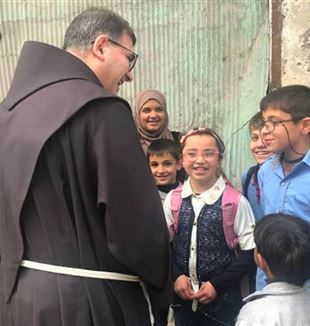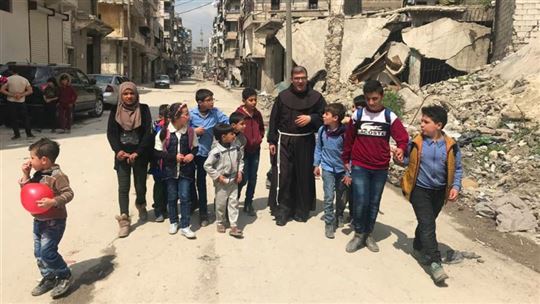
Fr. Firas: "This is how Syria suffers"
Fr. Firas Lutfi speaks about his fellow Franciscan Brothers who live under Sharia law, about the children of Aleppo who suffer the cold, about the question of the meaning of innocent pain. But also about a faith that grows day after day.Fr. Firas Lutfi is a Franciscan friar of the Custody of the Holy Land. A few months ago, he was in Beirut because he was appointed Minister of the Saint Paul region (Syria, Lebanon and Jordan). Where are “those forgotten in Idlib”, remembered by the Pope during the Angelus.
"No one would wish to carry such responsibility upon their shoulders. Everyday, I entrust myself to the Lord and I also entrust the thirty friars who live in these three countries to Him," he says. The situation is not simple. Whilst we interview him, the news reaches us that Lebanon has been declared bankrupt. Default. It is the Switzerland of the Middle East, which, for months, has been plagued by protests and demonstrations, and which has now given in. It has collapsed under the weight of an unsustainable economic debt, caused by the corruption of politics (where everyone is guilty, but no one feels responsible) and instability due to the influence of regional (Iran, Turkey, Gulf countries) and international forces.
"Our first concern, very concrete, is how to get aid to Syria. If until two years ago, in the midst of the war, we could somehow get money and basic necessities through the Lebanese border, today that is no longer the case because the entire Lebanese banking system is blocked". However, humanitarian emergency is not blocked: "If in Lebanon its hard to find work and the country is under the enormous pressure of millions of refugees, in Syria, in Aleppo and other more distant villages, there are children who are freezing to death". And that is not a metaphor. Clothes and blankets are literally missing, there is no oil to run generators, let alone electricity.
"This, I must say, is caused, predominately, by the international embargo that prevents aid from passing through Syria. It is the civilians who pay the highest price. We friars, however, do not leave, we stay to be close to our people". They stay in villages such as Yacoubie and Knaye, he says. There, Fr. Hanna Jallouf, 67 years old, and Fr. Luai Bsharat, forty years old, continue their charity work alongside more than three hundred Christian families, although for years now the whole area has been under the control of the jihadists and the Al Nusra militia. "They live under Sharia law. The churches and cemeteries have been stripped of their crosses, they cannot celebrate mass publicly or hold processions. Even the land (it is a large area of agriculture) cannot be cultivated and survival depends on the help of the few international NGOs that manage to reach them". The two Brothers take care of the whole Christian community, not only the Latin one, but also the Armenian and the Greek Orthodox communities. In recent weeks, after the clashes with Turkey, which invaded the area supporting the rebels, they have taken it upon themselves to help many Muslims who have fled the Idlib area or from refugee camps.
"I have not seen Fr. Hanna since 2013, it is too dangerous to go there, but we often speak on the phone and it opens my heart to know that they also remain to guard the places of Christian memory. Memory is very important, because we tread upon the land which was known as the ancient Antioch, mentioned in the New Testament, where, for the first time, the followers of Christ took the name Christians. Paul, Peter and Luke passed by there, and, still today, the Christians and friars present have an awareness of the great history to which we all belong: Christian history which is made up of charity and witness". This translates into food parcels for thousands of people, masses celebrated despite the conditions, assistance in hospitals, care for the education of young people, support for young couples who "increasingly less, but with an increasing conscience" decide to marry.
In hard-to-reach areas such as those where fighting takes place, people fight as hard as they can to survive, trying to escape the militias (the friars have been kidnapped several times, some parishioners have been killed) and to survive the winter which was particularly harsh this year. Leaving is not an option, also because it is now almost impossible. In these nine years of war, Christian presence in Syria has collapsed: there were almost two million in 2010, now many have fled.
In Aleppo, to give an idea, the population of Christians has reduced from 200,000 to 30,000. Those who now remain in the country are mostly the elderly, sick, children and widows. The few adults left have to deal with a lack of work. "Today, a dollar is worth a thousand Syrian lira. How can a family that earns 50 dollars a month live? How can they eat, dress and send their children to school? With a month’s income they can live for a week", Fr. Firas tells us again. He emphasizes a hidden plague, that of children born during occupations and orphaned or by women who have been raped and, therefore, who were never registered and were considered children of shame. In Aleppo alone there are about two thousand of them. They are between the ages of four and seven and wander around the city like ghosts. They are not registered in the registry office and they do not go to school. This is why the Franciscans and Ahmad Badreddin Hassoun, Grand Mufti of Aleppo, joined together to help them. For Muslims, there is no such thing as adoption, but the Mufti has conducted a study the result of which allows, with respect for religion, a Muslim family tp take care of a child and keep him in foster care until he comes of age. "I specifically want to help those children, because innocent pain questions us every morning, makes us ask the Lord for meaning.
Read also - Julián Carrón’s message for the death of Fr. Luigi Valentini
Everywhere, he explains, the need is great "and for this we ask the Lord every day for a stable faith". Without rhetoric he made it clear that it is like having a wound that never heals. "We are in Lent and, like Jesus, we are living Calvary. This war has touched us all, it touches us every day. No one here would have ever thought that they would have had to leave their land or die under bombs. It has shaken our hearts, our certainties, it made us get to know pain is in all its forms. But even if every now and then we are left in despair, we always have Jesus as an example. And our faith is strengthened, it becomes more mature day after day. As Saint Paul said, He is treasure in jars of clay. We are often afraid, we are overwhelmed by worries, but we continue to guard it so that it grows and bears fruit".